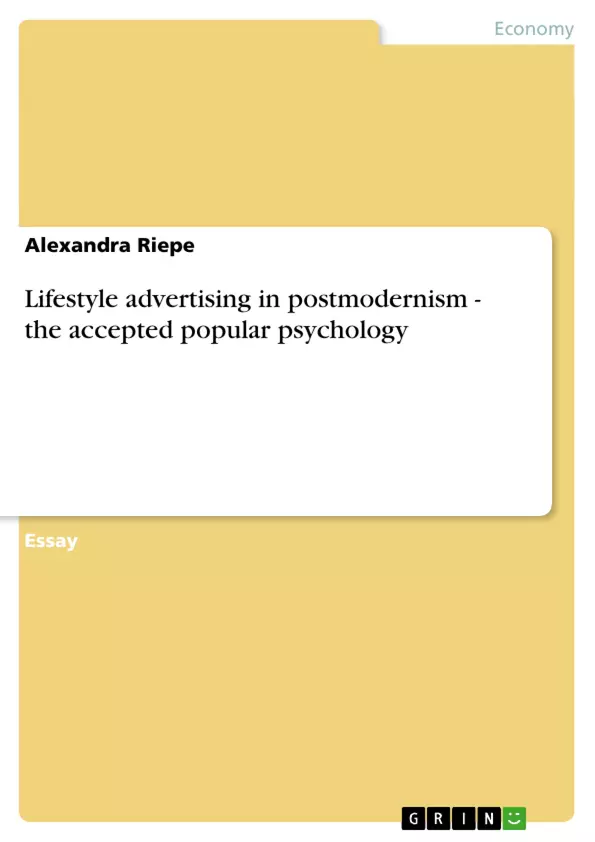‘The real world of postmodern culture … has entertainment as its ideology, the spectacle as the emblematic sign of the commodity form [and] lifestyle advertising as its popular psychology’ (Kroker and Cook cited by Liu, 1998). This quote should demonstrate which changes postmodernism evokes. One of these changes is the emergence of lifestyle advertising explained here as a popular psychology which stands for its marketing character as being a persuasive and convincing form of advertising. Its aims are to fill the consumers
with emotions of a specific lifestyle they should strive for to live. Therefore, lifestyle advertising can be seen as an important appearance out of the postmodern age, which will be defined and explained in this paper. Moreover, adverts will be presented in order to show how semiotic analysis can reveal the workings of lifestyle advertisements. With the aim of illustrating how this will work, three lifestyle adverts from the destination Australia were
selected and analyzed by using semiotic terms and explanations. Nevertheless, the paper is also focusing on demonstrating how the emergence of lifestyle advertising is a reflection of cultural changes in the postmodern age. Those cultural changes will be illustrated and a connection between postmodernism and tourism will be drawn. However, this paper starts with explaining postmodernism from different points of views of scholars and authors, such as Featherstone, Lyotard or Singh, who defined and explained the term postmodernism in their way of experience and understanding.
Inhaltsverzeichnis (Table of Contents)
- Lifestyle advertising in postmodernism - the accepted popular psychology
- Postmodernism
- Lifestyle advertising and consumer culture
- Lifestyle Advertising
- Semiotic analysis of lifestyle advertising
Zielsetzung und Themenschwerpunkte (Objectives and Key Themes)
This paper explores the concept of lifestyle advertising as a popular psychology that reflects cultural changes within the postmodern era. It aims to demonstrate how this form of advertising works by analyzing specific examples from the tourism industry, drawing connections between postmodernism and tourism, and employing semiotic analysis to decode advertising messages.
- Postmodernism and its influence on culture and consumerism
- The emergence of lifestyle advertising as a response to postmodern trends
- The role of semiotic analysis in understanding lifestyle advertising
- The relationship between postmodernism, tourism, and the transformation of travel experiences
- The impact of lifestyle advertising on consumer perceptions and choices
Zusammenfassung der Kapitel (Chapter Summaries)
The paper begins by outlining the key characteristics of postmodernism, examining diverse perspectives from scholars like Singh, Jessup, Jameson, Featherstone, and Lyotard. It then explores how postmodernism has influenced cultural changes, particularly within the realm of tourism, highlighting the rise of niche travel experiences and the evolving consumer preferences for personalized and unique vacations. This shift is illustrated through examples like the increasing popularity of city trips and the emergence of the ‘service class’ as a new cultural intermediary. The paper further explores the significance of the internet and technological advancements in reshaping how information is disseminated and accessed, leading to a new cultural framework within postmodern society. The concept of lifestyle advertising is introduced as a marketing strategy that capitalizes on the symbolic meanings associated with products and services. By understanding the underlying motivations for consumer behavior in a postmodern context, the paper demonstrates how marketers can effectively utilize lifestyle advertising to promote brands and products that align with individual desires for distinction and self-expression. Finally, the paper presents a framework for analyzing lifestyle advertising through the lens of semiotics, highlighting the key elements of signifier, signified, and referent and explaining how these components contribute to the overall message and interpretation of an advertisement.
Schlüsselwörter (Keywords)
Lifestyle advertising, postmodernism, consumer culture, tourism, semiotic analysis, cultural change, niche markets, signifier, signified, referent, symbolic meaning, individualization, consumption, postmodern tourism.
- Quote paper
- Alexandra Riepe (Author), 2011, Lifestyle advertising in postmodernism - the accepted popular psychology, Munich, GRIN Verlag, https://www.grin.com/document/191219




